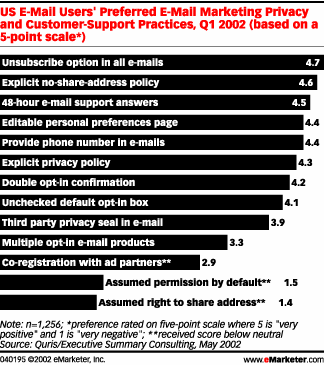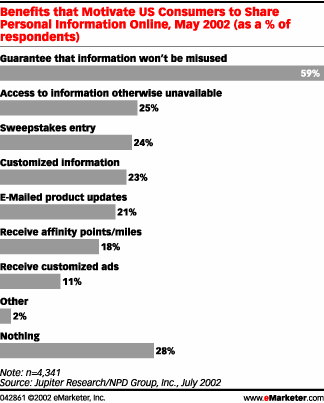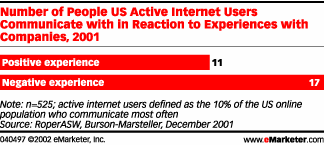E-Mail Privacy Needs Permission

The key to a strong e-mail marketing campaign is gaining recipients’ permission. David Hallerman explains that a trusting customer is an interested customer.
When pulling together a company e-mail list, some techniques work better than others for marketers who respect their customers’ privacy. As Jean-Paul Hepp, director of global privacy for Pharmacia, told MarketingSherpa, e-mail marketing programs must “go beyond just meeting legal standards in order to proactively grow consumer trust.”
So what do US consumers want in the realm of e-mail privacy?
Several conditions received a preference rating of 4 points or more (on a scale of 5 as “very positive”) in a Quris/Executive Summary Consulting survey in early 2002. The freedom to opt-out easily, with an unsubscribe option in all e-mails, ranks number one at 4.7 points. Nearly equal in importance (at 4.6) is an explicit no-share-address policy, an indication that even “benign” UCE can be seen as spam, and as an abuse of privacy.
At the negative end of the scale, e-mail users don’t want companies to make assumptions about permission (at 1.5 points) or the right to share their e-mail address (at 1.4).

Therefore, avoiding e-mail privacy violations is both simple and complex: get permission first. The idea (and ideal) of sending e-mails only to people who want them is surely as simple a marketing concept as exists. But getting that permission, giving the consumer enough value to make her say yes, is a complex task.
Besides the somewhat general category of personalization, US consumers mention several specific benefits that motivate them to share personal information, such as e-mail addresses. In a July 2002 Jupiter Research report titled “Loyalty Programs Alone Won’t Provide Panacea for Smart Cards,” 59% cited a guarantee that the information would not be misused. That’s a double-negative sort of benefit.
On the clearly positive side, other benefits Jupiter survey respondents mentioned included access to information otherwise unavailable (25%), customized information (23%), and the ever-popular sweepstakes entry (24%). The company definitely wins by getting the consumer?s personal information, but what are the odds of any single consumer winning a sweepstakes?

Further Jupiter data indicates that in exchange for rewards, the most likely bit of information to be swapped is an e-mail address, true for 61% of US shoppers surveyed in June 2002.
For companies willing to infringe upon consumer privacy by sending e-mails without permission, it’s worth remembering that there’s truth in tradition: bad news travels faster than good news. When the New York-based public relations firm of Burson-Marsteller commissioned a survey of active internet users (defined as the 10% of the US online population who communicate most often), it found that when active users have a positive experience with a company, they tell 11 other users; but when the experience is bad, 17 other users hear about it.

Therefore, when formulating an e-mail campaign, it’s worth remembering that if consumers trust a company, they more likely feel their privacy wishes are respected.
Source: